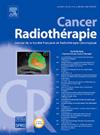根据快进方案的超低分割乳腺放疗:良好的早期耐受性或延迟皮肤反应?真实生活体验
IF 1.4
4区 医学
Q4 ONCOLOGY
引用次数: 0
摘要
目的:在过去的三十年中,乳腺癌放疗的分割已经发生了变化,有向低分割方案发展的趋势。Fast-Forward试验评估了一种放疗方案,分为每日5次,为传统方案提供了一种潜在的有效且更方便的替代方案。本研究的主要目的是评估根据快进方案接受低分割辅助放疗的乳腺癌患者的急性皮肤反应,以及他们的发病时间。材料和方法本回顾性单中心研究在居里研究所进行,包括所有接受快速前进方案(26 Gy,每日5次)放疗的早期乳腺癌患者。通过临床检查和乳房x光检查进行随访;根据CTCAE v.5标准评估皮肤毒性。结果2014年12月至2022年12月,255例患者接受了Fast-Forward方案的治疗。患者的中位年龄为76岁。其中93.7%为浸润性癌,93.3%为T1或T2期肿瘤。46.3%的患者采用仰卧位,53.7%的患者采用等心侧卧位。急性放射性皮炎35例(13.7%),以1级为主,2级4例(1.6%)。急性放射性皮炎发生的平均时间为1.6个月。24例(9.4%)患者出现延迟毒性事件,包括水肿、持续皮肤色素沉着和乳腺纤维化,其中1.2%为2级。没有3级或更高的急性或延迟毒性的报道。结论26 Gy 5次乳腺辅助放疗方案的疗效和良好的耐受性已得到证实。对这组同质患者的监测强调了延迟急性皮肤反应的可能性。在治疗期间进一步咨询似乎有必要诊断和治疗这些反应。本文章由计算机程序翻译,如有差异,请以英文原文为准。
Ultra hypofractionated breast radiotherapy according to the Fast-Forward scheme: Excellent early tolerance or delayed skin reactions? Real life experience
Purpose
Over the past three decades, the fractionation of radiotherapy for breast cancer has evolved, with a trend towards hypofractionated regimens. The Fast-Forward trial evaluated a radiotherapy protocol in five daily fractions, offering a potentially effective and more convenient alternative to conventional regimens. The primary objective of our study was to evaluate acute skin reactions in patients receiving hypofractionated adjuvant radiotherapy for breast cancer according to the Fast-Forward protocol, along with their time to onset.
Materials and methods
This retrospective single-centre study was conducted at the institut Curie, including all patients treated for early breast cancer with radiotherapy according to the Fast-Forward regimen (26 Gy in five daily fractions). Follow-up was performed by clinical examinations and mammography; skin toxicity was assessed according to CTCAE v.5 criteria.
Results
Between December 2014 and December 2022, 255 patients were treated according to the Fast-Forward regimen. The median age of patients was 76 years. Of these, 93.7 % had invasive carcinomas, and 93.3 % had tumours staged T1 or T2. Treatments were performed in supine position for 46.3 % of patients and in isocentric lateral decubitus position for 53.7 %. Acute radiodermatitis was observed in 35 patients (13.7 %) mainly grade 1, and 4 patients (1.6 %) had grade 2 radiodermatitis. Acute radiodermatitis occurred after a mean period of 1.6 months. Delayed toxicity events were noted in 24 patients (9.4 %), including oedema, persistent skin pigmentation, and breast fibrosis, 1.2 % of which were grade 2. No acute or delayed toxicity of grade 3 or higher was reported.
Conclusion
The efficacy and good tolerance of the adjuvant breast irradiation regimen of 26 Gy in five fractions has already been proven. Monitoring of this homogeneous group of patients highlighted the possibility of delayed acute skin reactions. Further consultation during treatment seems necessary to diagnose and treat these reactions.
求助全文
通过发布文献求助,成功后即可免费获取论文全文。
去求助
来源期刊

Cancer Radiotherapie
医学-核医学
CiteScore
2.20
自引率
23.10%
发文量
129
审稿时长
63 days
期刊介绍:
Cancer/radiothérapie se veut d''abord et avant tout un organe francophone de publication des travaux de recherche en radiothérapie. La revue a pour objectif de diffuser les informations majeures sur les travaux de recherche en cancérologie et tout ce qui touche de près ou de loin au traitement du cancer par les radiations : technologie, radiophysique, radiobiologie et radiothérapie clinique.
 求助内容:
求助内容: 应助结果提醒方式:
应助结果提醒方式:


